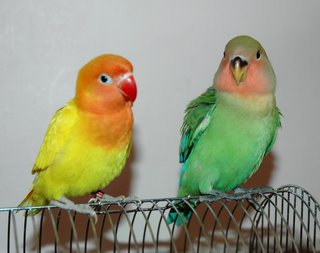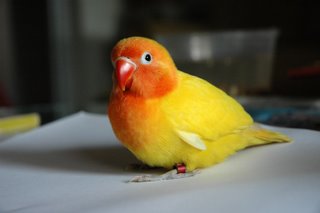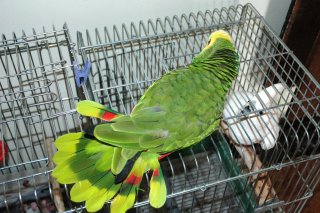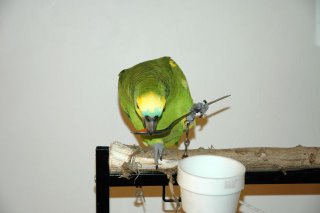Baby, the Blue and Gold MacawBaby is a three year old macaw when she came to me and has been with at least three previous owners before. I'm glad to be able to take over the care of Baby because I have seen her through most of her three years as both her previous owners are my friends. I just hope with my heart, this will be her last home ever.  This friend of mine unfortunately has to give up all his parrots due to some personal issues. Somehow, Baby must have sensed something because the feather chewing habit she once had with the second owner came back again just before her latest owner place her under my care. Her previous owner, my friend, informed me she started feather picking in the week long vacation he took recently, whereby only the maid cared for the bird. She also has this habit of bending her beautiful tail feathers and uses them to tickle her face. As funny as it can be, it does damage most of her tail feathers some of which are broken in this manner. We believe these are due to all those unexpended macaw energy and boredom that pushes her into this self-destructive behaviour. So it’s a challenge for me to find means to address this relapse. Initially, I'm pretty daunted by her massive size, of which I'm not used to (the biggest bird I'm comfortable with is my blue fronted Amazon, Bodhi). While Baby has to cope with adjusting to a new home and new caregivers, my family and I have to learn to overcome our fear for her, despite my keenness in keeping a macaw! I'm with the rationale that keeping companion parrots require not just the behavioural modifications on the part of these intrinsically wild but super intelligent creatures, but also demand changes in our attitude and behaviour. This is to allow for confidence and trust building between both us and our parrots. So back to Baby's story, I have it going between me and her. Initially, she nips me pretty hard with scratches, bleeding and bruises to prove the point. Basically, she tested me all the time to see how far she can go with me. Thankfully, over time, my fear for her has slowly dissipated as I get used to her size and begin to understand her macaw personality better. All these threats, squawking and lunging are part of her mischievous and playful way of getting some fun out of me--a fearful stranger! So once my fear for her dissipates and while she begins to get used to the new home and people, things progress rapidly. Now, not only am I able to step her up and handle her, I'm also able to cuddle her, kiss her and even cut her nails and clip her wings without any restrain. She might complain with some squawks and half hearted nips but she knows her place and what kind of relationship we're both in and grudgingly cooperates...but not without some show of disagreement to retain her pride.
This friend of mine unfortunately has to give up all his parrots due to some personal issues. Somehow, Baby must have sensed something because the feather chewing habit she once had with the second owner came back again just before her latest owner place her under my care. Her previous owner, my friend, informed me she started feather picking in the week long vacation he took recently, whereby only the maid cared for the bird. She also has this habit of bending her beautiful tail feathers and uses them to tickle her face. As funny as it can be, it does damage most of her tail feathers some of which are broken in this manner. We believe these are due to all those unexpended macaw energy and boredom that pushes her into this self-destructive behaviour. So it’s a challenge for me to find means to address this relapse. Initially, I'm pretty daunted by her massive size, of which I'm not used to (the biggest bird I'm comfortable with is my blue fronted Amazon, Bodhi). While Baby has to cope with adjusting to a new home and new caregivers, my family and I have to learn to overcome our fear for her, despite my keenness in keeping a macaw! I'm with the rationale that keeping companion parrots require not just the behavioural modifications on the part of these intrinsically wild but super intelligent creatures, but also demand changes in our attitude and behaviour. This is to allow for confidence and trust building between both us and our parrots. So back to Baby's story, I have it going between me and her. Initially, she nips me pretty hard with scratches, bleeding and bruises to prove the point. Basically, she tested me all the time to see how far she can go with me. Thankfully, over time, my fear for her has slowly dissipated as I get used to her size and begin to understand her macaw personality better. All these threats, squawking and lunging are part of her mischievous and playful way of getting some fun out of me--a fearful stranger! So once my fear for her dissipates and while she begins to get used to the new home and people, things progress rapidly. Now, not only am I able to step her up and handle her, I'm also able to cuddle her, kiss her and even cut her nails and clip her wings without any restrain. She might complain with some squawks and half hearted nips but she knows her place and what kind of relationship we're both in and grudgingly cooperates...but not without some show of disagreement to retain her pride.
She's such an exceptional macaw! Rarely does she exercise the full power of the macaw voice she is capable of. Instead, she prefers to mumble and talk human. Why, my Tara can even be louder than Baby on many occasions. That is how it’s even possible to house her in my apartment when almost all parrots literature says no to macaws in apartments. 
Still, lots of room space in my bird room has to be dedicated to fulfill her needs. In fact, half the room I give her and she went on to claim ¾ of it! She used to be housed on a single perch stand alone and I suspect this contribute partly to the problem of boredom for such a hyperactive and large bird. I build her a play gym made out of non-toxic acacia branches. Also, I got her a roomy approx 5 feet macaw cage. 
Part of the challenges of keeping her, as do all large macaws, is to find enough toys and activities to keep them engaged and away from boredom and her feather chewing habits. I provide her with a play gym with toys and natural branches to play with. I have also started to bathe her several times a week, which she relishes much, flapping her wings with gusto and imitating human laughter while drying her feathers. All this while, monitoring and keeping a close observation to see how the feather chewing is developing.
I also use a bitter spray to discourage her tendency to chew her feathers.
I’m glad to say the combination of a big cage, big play gym, daily human interactions, balanced stimulating diet, weekly misting bath and toys have helped. She has not been feather chewing for some time and the tail feathers are growing back.
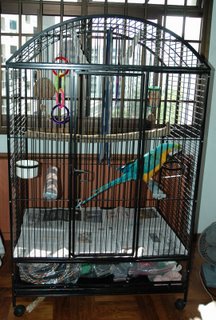 Baby's cage where she's housed when no one's at home to supervise her and when its time to sleep at night.
Baby's cage where she's housed when no one's at home to supervise her and when its time to sleep at night.
Macaws are known to speak human although not very well. Talk human she did, which make me pleasantly surprised when she says "hello", "what", "whatever", "go back", "Robert", "huh?', "step up", "stop it" and "bye bye", many a time within the right contexts and situation. She'll lift up her feet and say "step up" when she wants to play. When Tara or Bodhi is doing their morning vocalizations and getting too noisy, she might say "stop it". If she don't like what you're doing to her, say clipping her nails, she' say it too.
 Once, she found her way to the window railings, look out the window into the open sky and trees in the park and turn to me saying, "Bye Bye". I would have a heart attack there and then if I did not know the window glass panel has already been closed!
Once, she found her way to the window railings, look out the window into the open sky and trees in the park and turn to me saying, "Bye Bye". I would have a heart attack there and then if I did not know the window glass panel has already been closed!
I believe as large birds with large personalities, they will continue to test the boundaries with us and see how much they can tweak us around. And for a tame macaw that’s comfortable with humans, this can be done with a playfulness and high level of energy that is distinctively macaw. On the other hand, particularly with macaws that are tender of age, they may behave mildly and sweetly. Let not these baby stages deceive us into letting down our guards for their powerful beaks are to be respected. And there may be times when they get over stimulated in their play with us and deliver a hard damaging nip. Consistent socialization and having the firm upper hand will go a long way in our lives with these monkeys of the parrot world.
Boy have I learnt alot since taking in this big Baby!


